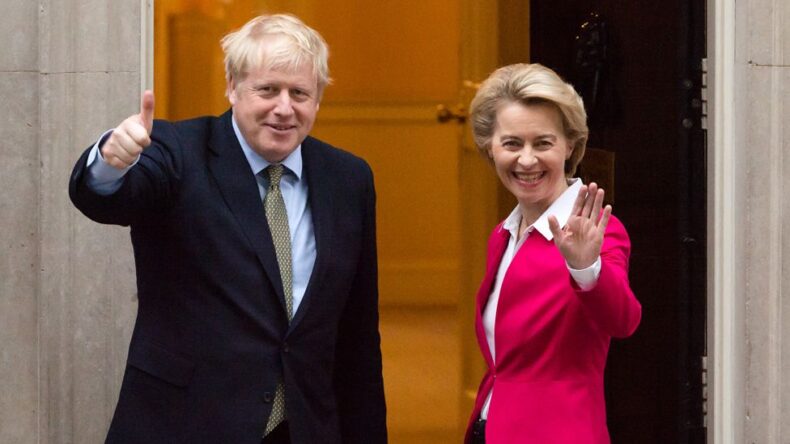Is the European Union giggling gleefully over Boris Johnson’s defeat? True, but also false.
We have a very low use of alcoholic beverages in the (European) Commission,” a spokesperson for the EU chuckled when asked by journalists on Thursday if any extra bottles of champagne had been ordered in response to the announcement of his resignation.
This is likely an insult directed at Mr. Johnson as he recently acknowledged that there was “a problem with drinking” in UK political circles. As part of the rigorous Covid-19 lockdown, he was also charged with tolerating and attending drunken events at Downing Street. It was just one of the numerous controversies that ultimately led to his removal from office under political pressure.
The European press is full of sneers and grins. The EU does not adore Mr. Johnson.
That has less to do with the EU’s distaste of Brexit in general, which is undoubtedly present. However, Johnson’s reputation in Europe as having handled the UK’s exit from the bloc poorly in the eyes of Brussels is largely to blame for this.
Duplicitous would be a polite word to describe how that is seen by European politicians.
The Prime Minister is charged by EU leaders with blustering his way through Brexit and failing to be truthful with the British people about its genuine ramifications. He’s seen by EU leaders as continually shifting and changing rather than negotiating and maintaining his word on post-Brexit deals with Brussels. More concerned with pleasing the political crowd at home than with upholding its international commitments or consistently acting in the UK’s (what the EU perceives to be its) best interests.
Even the most complacent of EU officials, like as the German chancellor, have expressed concern about the Johnson government Bill that is presently making its way through the UK Parliament and seeks to unilaterally alter the international post-Brexit treaty on Northern Ireland.
Berlin’s vocal criticism of the UK is unusual, but the French are never afraid to criticise the UK over Brexit.
Germany’s foreign minister, Annelena Baerbock, made a thinly veiled shot at Mr. Johnson last week: “London is unilaterally breaching accords… and it is doing so for expected objectives of its own,” she said. “We cannot allow that in the EU.”
On Thursday, Bild, the largest tabloid in Germany, yelled “Borexit.” Additionally, it decided to write the English headline “Bye Bye Boris.”
While the top tabloid in Denmark, Ekstrabladet, parodied Mr. Johnson’s election-winning promise to complete Brexit with the headline, “Now he is done.”
Even steadfast UK allies like Denmark and the Netherlands began to exhibit overt symptoms of frustration when Mr. Johnson became involved in the Brexit negotiations. specifically to the agreement on Northern Ireland after Brexit.
Also deteriorating were ties to the neighbouring Irish Republic. According to Irish Prime Minister Taoiseach Micheál Martin, they became “strained and challenged.” On Thursday, he did, however, point out that Mr. Johnson’s departure might present a chance for a “reset.”
Former EU Brexit negotiator Michel Barnier, a frequent lecturer, expressed optimism as well. He said in a tweet on Thursday that the EU and the UK may be starting a new chapter as a result of this. “More cordial, more helpful, more respectful of obligations made, particularly towards peace & stability in Northern Ireland…,”
Most EU officials I’ve spoken with encourage me to “Dream On!”
They tell me that rather than being a protest against his policies—whether they are related to Brexit or not—they see the mass resignations of Conservative ministers close to Boris Johnson as career-saving manoeuvres.
“More uncertainty for us Europeans is all that this Johnson resignation will bring. Instead of looking outward to allies overseas, the UK is more inwardly focused on its own domestic issues “One EU ambassador who spent years working on Brexit complained that he was especially frustrated.
Talking about the war in Ukraine, Boris Johnson’s attitude towards Russia is one aspect of his premiership that – not only Kyiv – but EU and Nato members in Eastern and Central Europe will miss very much.
Back in December, even before the Kremlin’s invasion of Ukraine, Poland’s prime minister – Mateusz Morawiecki – told me Mr Johnson clearly understood the Russian threat, unlike many other leaders in the West.
Central European diplomats were often unwilling to criticise Mr Johnson in public over Brexit because, they said privately, he was such a close ally when it came to security matters (in this context, they meant Russia).
But even they believe this to be a UK stance, rather than a hawkish attitude peculiar to Boris Johnson.
One senior official told me, somewhat jokingly, “I’m keeping one hand in my bag of popcorn, and the other on my worried heart,” summarising the EU’s mixture of interest, Schadenfreude, and fear over what might come next in the wake of Boris Johnson’s demise.













